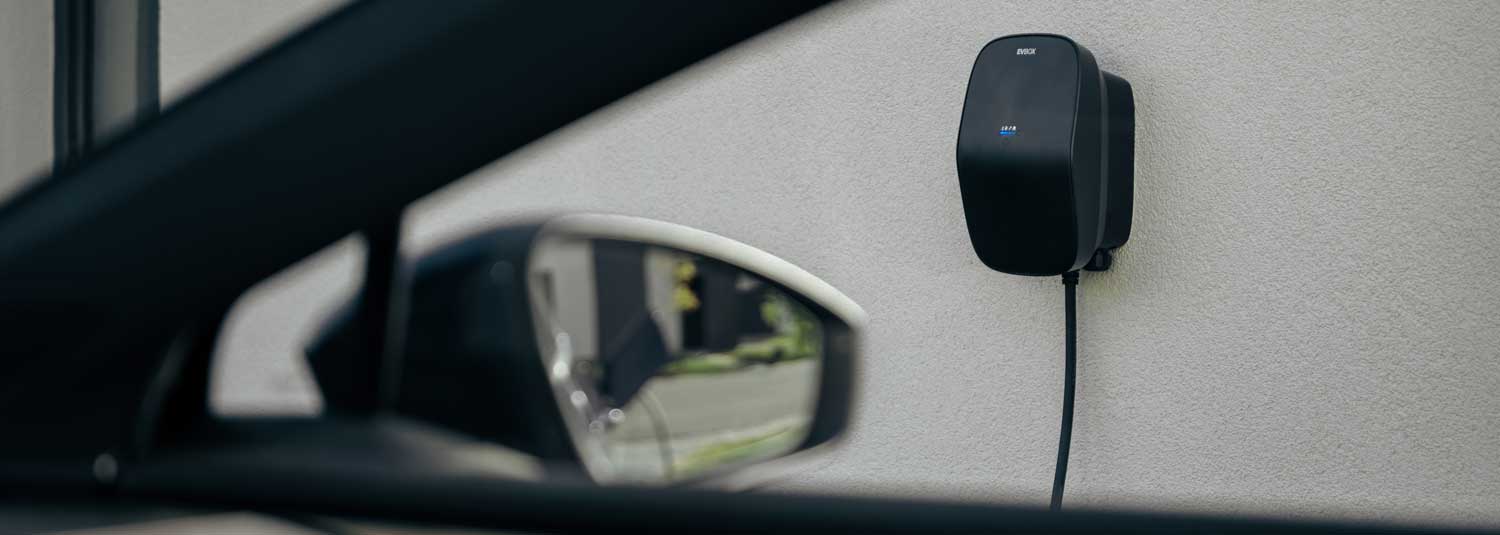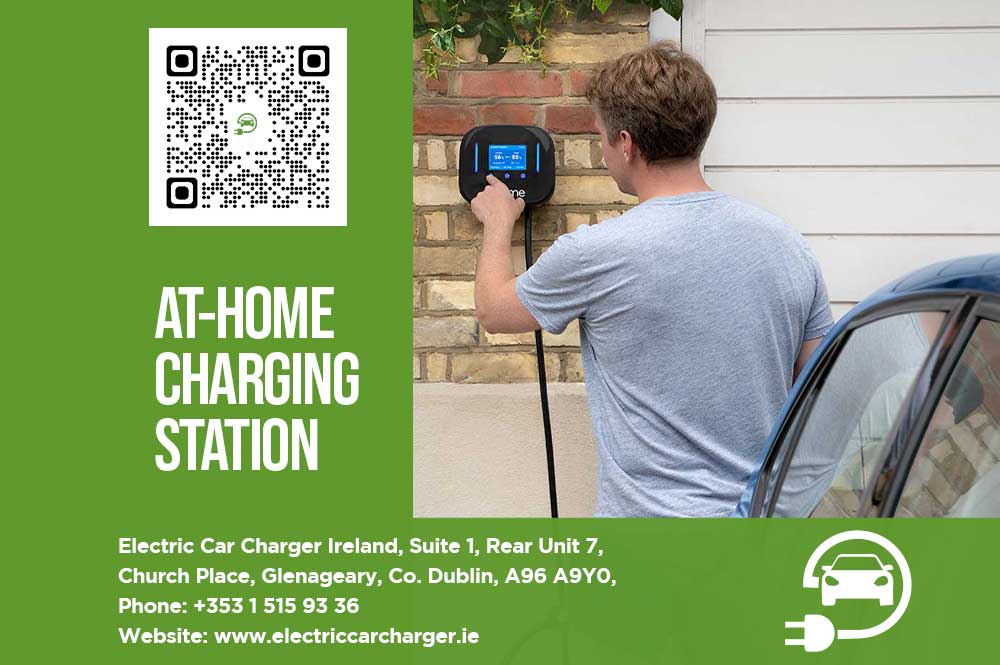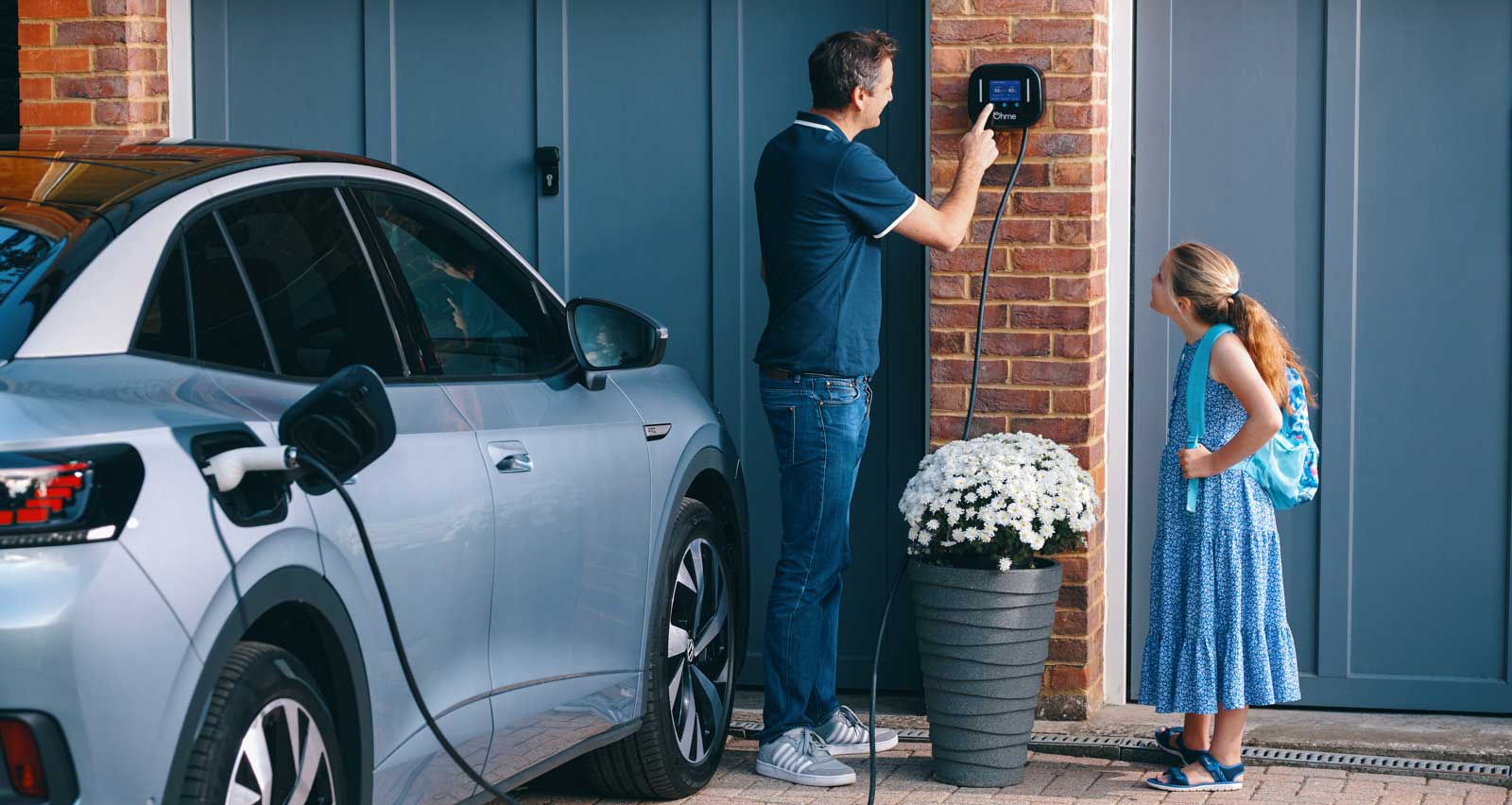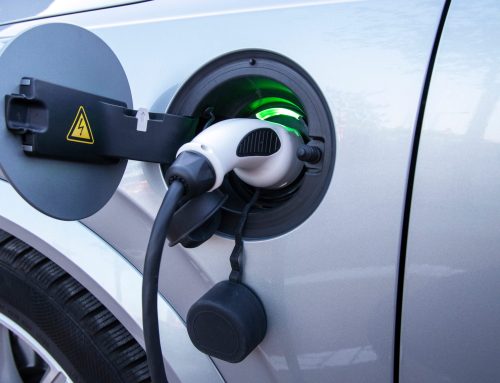Table of Contents
- Types of At-Home EV Charging Solutions
- Benefits of Installing an At-Home EV Charging Station
- Choosing the Right Home Charger for Your Electric Vehicle
- Professional installation vs. DIY installation
- Installation Process and Requirements
- Post-installation testing and maintenance
Imagine this scenario; You arrive home after a day, at work. Your electric car is almost out of battery. You were scrambling to find a public charging station and picture the convenience of simply plugging in your vehicle right in your garage. With an at-home EV charging solution, this vision can become a reality.
As more individuals transition to vehicles it’s essential to grasp the options and advantages of home charging. Not does it offer convenience but it can also lead to long-term cost savings and provide you with greater control over your charging routine. In this piece, we’ll delve into the realm of at-home EV charging by examining the charger types their benefits and how to select the optimal setup for your requirements.
Types of At-Home EV Charging Solutions
When it comes to charging your vehicle at home there are two choices; Level 1 and Level 2 charging. Lets explore each option in detail.
Level 1 charging (120V is a common output for home charger units.)
Level 1 charging (120V) also referred to as ” trickle charging ” stands out as the choice for, at-home EV charging.
To charge your car at home simply plug it into a 120V outlet using the provided charging cable (More info on – Home Car Charger). This method, known as Level 1 charging is the cost effective option but is also the slowest giving you about 4 5 miles of range for every hour of charging (More info on – Cost to Charge Electric Car Calculator Tool).
Advantages of Level 1 charging;
- No need, for equipment or installation
- Works with any 120V outlet
- Great for overnight charging or quick top-ups
Disadvantages of Level 1 charging;
- Slow speed (4 5 miles per hour)
- Not ideal for long commutes
- Takes more, than a day to fully charge a drained battery
Level 2 charging (240V)
Moving on to Level 2 charging (240V) this option provides faster and more efficient EV charging right at home.To set up Level 2 charging you’ll need a 240V charging station that can provide from 12 to 80 miles of range, per hour depending on the charger and your vehicle (More info on – EV Charging Station Contractors).
Advantages of Level 2 charging include charging speeds compared to Level 1 the ability to fully charge EVs overnight and suitability for drivers with longer daily commutes or multiple EVs.
On the side Level 2 charging requires installation by a qualified electrician comes with a higher initial cost for both the station and installation and might necessitate upgrades to your home’s electrical system (More info on – Home Charger for Electric Cars).
Here’s a comparison, between Level 1 and Level 2 charging;
| Feature | Level 1 Charging | Level 2 Charging |
|---|---|---|
| Voltage | 120V | 240V |
| Charging Speed of the best EV charger models | 4 5 miles/hour | 12 80 miles/hour |
| Installation Required | No | Yes |
| Cost | Moderate to High | |
| Best For | Overnight top ups charges | Daily use longer drives |
Benefits of Installing an At-Home EV Charging Station
The advantages of setting up a home EV charging station are plentiful (More info on – Electric Charging Stations). Can enhance your electric vehicle ownership experience in ways (More info on – Charging station for electric vehicle).
Convenience and accessibility
Having a home charging station offers the convenience of round the clock access, to charging facilities. Say goodbye to the hassle of locating public charging points or fretting over their availability – you can charge your vehicle at your leisure within the confines of your abode (More info on – EV Public Charging). This accessibility allows you to conveniently recharge your battery overnight ensuring you’re always set for your morning journeys.
Financial savings
Although installing a home charging station involves an investment it can result in long term savings compared to relying on public charging infrastructure. In Ireland the average cost of home charging stands at €0.20 per kWh while public stations may charge €0.33 or more per kWh (More info on – How Much Does It Cost To Charge An EV). Over time these savings can accumulate, making at home charging an choice, for EV drivers.
Customisation and control
By having a home charging station you gain the freedom to select the charger that best suits your requirements and preferences.
Whether you value charging, advanced features or stylish design there are plenty of options to meet your needs. Many modern charging stations come with home integration and scheduling features allowing you to conveniently manage and monitor your charging from using your smartphone or other devices.
Additionally having an EV charging station, at home can increase the value of your property. As electric vehicles gain popularity having a built-in charging solution can make your home more appealing to buyers down the road (More info on – EV Chargers Ireland). By future-proofing your property with EV charging infrastructure you’ll be well prepared to capitalize on the rising demand for vehicles, in the future.
Choosing the Right Home Charger for Your Electric Vehicle
When it comes to picking out the home charger for your electric vehicle there are a few important factors to take into account (More info on – Electric Vehicle Chargers Ireland). It’s crucial to ensure that you’re getting the value for your money and that the charger will cater to all your EVs requirements.
Factors to Keep in Mind
To begin with, it’s essential to make sure that the charger you select is compatible with your electric vehicle. Not all chargers are the same. Some may not be suitable for certain EV models. It’s like trying to force a peg into a round hole – it just won’t work.
Additionally, think about the charging speed and power output. If you’re always on the move and need a charge opting for a charger with higher power output is advisable. On the other hand if you prefer a more gradual approach a lower power output might be sufficient.
Smart functions and connectivity are also factors pondering over. Some chargers offer features like remote monitoring, scheduling capabilities and integration with smart home systems. It’s akin to having your own personal assistant, for your EV!
Lastly, remember to prioritize safety and reliability certifications when choosing a charger. It’s important to opt for a charger that has undergone testing and complies with all safety standards. Nobody wants any surprises like fireworks displays in their garage.
Top Home EV Chargers Available
Now that you have an idea of what to consider let’s explore some of the home EV chargers currently on the market.
The Zappi EV Charger; This device is like the all in one tool for EV charging. It boasts features and works seamlessly with various EV models.
The EO Mini Pro 2; If space is limited this compact charger is a choice. Despite its size, it delivers impressive charging speeds and reliability.
The WallBox Pulsar Plus; Known for its design and user-friendly interface this charger is reminiscent of Apple products, in the EV world. Additionally, it offers an app for convenient remote control and monitoring.
Let’s compare the features, prices and customer feedback to assist you in making a choice. Here is a handy comparison table for the chargers available;
| Charger | Zappi EV Charger |
|---|---|
| Power Output | 7kW |
| Smart Features | Yes |
| Price Range towards the purchase and installation of a home charger | €800 €1000 |
| Customer Rating | 4.5/5 |
| Charger | EO Mini Pro 2 |
|---|---|
| Power Output | 7kW |
| Smart Features | No |
| Price Range towards the purchase and installation of a home charger | €600 €800 |
| Customer Rating | 4.2/5 |
| Charger | WallBox Pulsar Plus |
|---|---|
| Power Output | 7kW |
| Smart Features | Yes |
| Price Range towards the purchase and installation of a home charger | €700 €900 |
| Customer Rating | 4.4/5 |
Professional installation vs. DIY installation
When it comes to setting up your home EV charger you have two options. Hiring an electrician or going the DIY route.
While it might be tempting to save money by installing the charger yourself there are significant advantages to choosing a professional. They possess the expertise and experience to ensure the safe and proper installation of your charger. Additionally, they can assist with permits and approvals as well as recommend an optimal location, for your charger.
On the flip side opting for a DIY installation poses its own set of risks and difficulties. If you lack knowledge there is a possibility of damaging your home’s wiring or causing harm to yourself.
Furthermore opting for a DIY setup might void the warranty of your charger. Result in safety issues that could lead to expensive repairs later on.
To put it simply although the idea of DIY installation may be appealing it’s generally wiser and more dependable to entrust the task to professionals.
Installation Process and Requirements
So you’ve selected your home EV charger. Decided to engage a skilled electrician. That’s a decision! Now lets delve into what the installation process involves.
Pre-installation considerations
Before your electrician can commence installing your charger there are factors to take into account.
- Evaluating your home’s capacity – Initially, your electrician will need to evaluate your home’s electrical capacity to ensure it can support the additional load from an EV charger (More info on – The Essential Guide to Choosing an EV Charger Electrician). This may entail inspecting your fuse board and wiring to determine if any upgrades are required.
- Selecting the placement for your charger – Next, you’ll need to choose where best to position your charger. It should be conveniently located near where you park your EV and close, to an electrical source. Your electrician can assist in determining the suitable location based on your home’s layout and wiring considerations.
- Before installing the charger, check the permits and approvals required based on your location and the type of charger being installed. Your electrician will be able to guide you through this process as they’re familiar, with the requirements.
Following all installation considerations it’s time to proceed with installing your charger.
The installation process may vary depending on your charger model and home setup. Here’s a general overview:
- The electrician will begin by isolating the power supply to ensure safety.
- They will then run the wiring from the fuse board to where the charger will be located.
- Finally, they’ll securely mount the charger either on a wall or designated area.
- Lastly, they will connect the charger to the wiring. Test it to make sure everything is working correctly.
Safety precautions and best practices
Throughout the installation process, your electrician will adhere to safety measures and best practices to guarantee a dependable installation. This involves using the tools and equipment following manufacturer instructions and complying with all safety standards and regulations.
Post-installation testing and maintenance
Once your home EV charger is set up it’s crucial to verify its operation and conduct maintenance to maintain its efficiency.
Checking the functionality of your charger
Following installation your electrician will perform tests to confirm that your charger is operating as it should. This might include plugging in your EV and monitoring the charging process to ensure functionality.
Maintenance tips, for performance
To ensure that your home EV charger continues to perform regular maintenance is key. Here are some things you can do to maintain your, at home EV charger;
- Make sure to keep the charger and its surroundings clean and clear of any debris.
- Regularly check the charger and wiring for any signs of wear or damage.
- Follow the manufacturer’s guidelines for software updates and other maintenance tasks.
- Schedule professional. Maintenance as recommended by the manufacturer.
By following these maintenance suggestions you can help ensure that your at-home EV charger continues to provide efficient charging for years to come.
Incentives and Rebates for At-Home EV Charging
Government incentives and tax credits
In Ireland, the Energy Authority of Ireland (SEAI) offers a helpful grant to assist with the installation costs of an at-home EV charger.
The SEAI Electric Vehicle Home Charger Grant offers up to €300 towards purchasing and installing a home EV charger. This grant is applicable, for secondhand EVs as well as plug-in hybrid electric vehicles (PHEVs) registered since January 2018. Here’s how you can qualify for and apply for these incentives;
To be eligible, for the grant you need to meet the requirements;
- You should own an approved EV or PHEV.
- Your residence must be suitable for charger installation with space and electrical capacity.
- The charger should be installed by an electrician. Meet SEAIs technical standards.
- The charger should mainly be used for charging your EV at home.
To apply for the grant, simply follow these steps:
- Select a registered electrician with SEAI. Get a quote for the charger installation.
- Apply for the grant through SEAIs platform providing details about your EV and the planned installation of the charger.
- Once your application is accepted have the electrician install the charger and give you a Certificate of Completion.
- Send your payment request to SEAI with evidence of installation and payment made.
At-home electric vehicle (EV) charging solutions provide advantages, for car owners in Ireland, such as convenience saving money and customization possibilities. Selecting the charger and installation approach is essential to guarantee effective and secure charging (More info on – EV Charger Installers Near Me). Given the government incentives and potential cost reductions from utility providers and manufacturers, it’s an opportunity for EV owners or individuals contemplating transitioning, to vehicles to investigate at-home charging choices and elevate their EV ownership journey.
Related search terms: home EV charger Ireland, EV home charger Ireland, EV home charging Ireland, charge your car at home Ireland, best EV home charger Ireland, EV charger installation at home Ireland, electric car charging at home Ireland, home charging station for electric cars Ireland, installing a home EV charger Ireland, EV charging solutions for home Ireland, home charger unit for electric vehicles Ireland, electric vehicle charging at home Ireland, cost of home EV charging Ireland, home EV charger installation Ireland, home charging options for electric cars Ireland, EV home charger grant Ireland, electric car home charging station Ireland, benefits of home EV charging Ireland, setting up an EV home charger Ireland, home EV charging incentives Ireland
Ever wondered about Car Charger Fitting ….Check out our latest blog post for details.





